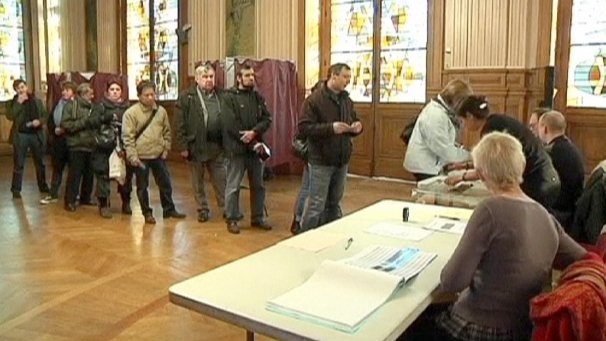
French turnout in the first round of the presidential election was more than 80%, one of the highest in the world.
It’s a measure of the Gallic fervor for election campaigning that the candidate who went on to earn fourth place in Sunday’s vote was able to draw crowds in their tens of thousands.
Jean-Luc Melenchon, the Left Front leader, invoked France’s revolutionary past while addressing packed street rallies ahead of the poll, in which he just about reached double figures.
But perhaps a more accurate reflection of the strength of political engagement came at the ballot box, where four out of five registered French voters cast a vote.
Turnout was slightly down on the 84% who voted in the last presidential election in 2007, but given the poor showings in the regional and European elections in the last few years, there had been fears it would be a lot lower.
And 80% far outstrips the turnout in the most recent national elections held in many of France’s neighbors, including Germany (71%), the UK (66%) and Switzerland (47%).
Turnout in France was surprisingly high, says Damien Philippot, research executive at the French Institute of Public Opinion in Paris.
“The polls last week ago showed that around 24% of people didn’t want to vote, and the week before it was 30%.
“So people have decided to vote at the last minute, young people and low-paid workers who are angry about unemployment and wanted to vote against the incumbent. Traditionally the older people and middle class vote anyway.”
Presidential elections always provide a “big moment” in the political life of France, Damien Philippot says.
“And in the last five years, a new generation of politicians has helped to attract younger people.
“Many people have also understood that the economic situation is very complicated and it’s important for them to give their opinion about it.”

Timing may play a part. The French vote was on a Sunday, while the British usually hold their general election on a Thursday, which is a working day for many.
But there’s also a different political culture in France to the UK, says Helen Drake, author of Contemporary France (2011) and a lecturer in French and European studies at Loughborough University in Leicestershire.
“In some ways French politics is anchored to the past and the notion that French politics is exceptional, and that exceptionalism is linked to the French Revolution of the late 1700s – that dramatic transformation in the French system from monarchy to republic.
“It didn’t overnight inculcate the republic in France but the idea of a French republic as a form of government is in their DNA and is characterized by a style of politics.”
There is an unmediated relationship between the leader and the people, at least symbolically, she says. The president is perceived to be able to change things – even if the reality often disappoints – so his election matters.
A written constitution with grand ideas of equality and fraternity takes French politics beyond the prosaic, she says, and this filters down to the street, to the cafes and to the rallies.
“There is a willingness to be seen, to be counted and to make a noise.”
But why is there such variation between comparable nations?
There are certain factors driving high turnouts in any well-established democracy, says Andrew Ellis of the Institute for Democracy and Electoral Assistance, based in Stockholm.
“Elections that look as if they will be close – either nationally or at district level – will attract high turnouts.
“Elections where there is a real choice, and the result matters, attract high turnouts.
“And elections conducted under electoral systems where people think that their vote counts and is likely to have an impact, generate high turnouts.”
France’s first round was closely fought and there was a real choice, he says, with a genuine sense among voters that a new president matters, in personality, leadership and policy terms.
By contrast, in Switzerland, general election turnout is very low because for many years it was often the same coalition governing.
Another boost to turnout in countries like France is the proportional-style system which means fringe parties are represented, says Andrew Ellis.
In the UK, turnout peaked in 1951, when the country gave Winston Churchill his second stint in Downing Street, and has been falling since, despite the odd spike.
“That brings into play another effect established in long-standing democracies, which is that the people get in to a habit of voting or not in about the first three national elections after they become old enough to vote,” says Andrew Ellis.
So the danger is that what’s happened in the UK and US, which also has low turnouts, means many people have been put off voting for life.
Compulsory voting
• Australia
• Argentina
• Brazil
• Uruguay
• Ecuador
• Luxembourg
• Belgium
• Greece
[youtube eVl9qsJQqNU]